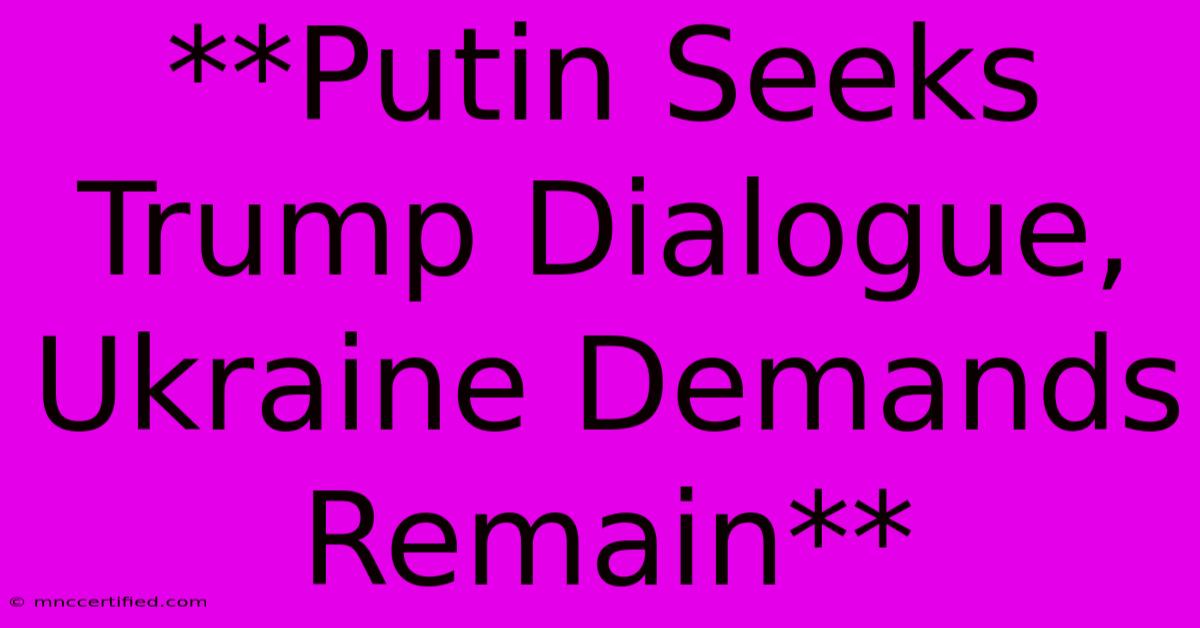**Putin Seeks Trump Dialogue, Ukraine Demands Remain**

Table of Contents
Putin Seeks Trump Dialogue, Ukraine Demands Remain
Amidst the escalating conflict in Ukraine, Russian President Vladimir Putin has expressed a desire for direct dialogue with former US President Donald Trump. While the Kremlin claims to be open to negotiations, Ukrainian officials have reiterated their unwavering demand for the complete withdrawal of Russian forces from Ukrainian territory. This dynamic highlights the complex geopolitical landscape and the divergent perspectives shaping the conflict.
Putin's Call for Dialogue: A Calculated Move?
Putin's recent remarks, suggesting a willingness to engage with Trump, have sparked speculation and raised eyebrows within the international community. Some observers interpret this move as a calculated attempt to wedge a rift between the US and Ukraine, potentially exploiting any perceived discord between the Biden administration and its predecessor. Others see it as a tactical maneuver to shift the blame for the ongoing conflict onto the US, portraying Russia as a party willing to negotiate while Washington is seen as an obstacle to peace.
Ukraine's Firm Stance: No Compromises on Territorial Integrity
Ukrainian officials, however, have remained resolute in their stance, emphasizing the non-negotiable nature of their territorial integrity. They view any dialogue with Russia as contingent upon the complete withdrawal of Russian troops from Ukrainian soil, including the Crimean Peninsula and the Donbas region. This unwavering position reflects the deep-seated desire for the restoration of Ukraine's pre-invasion borders and the rejection of any concessions that would legitimize Russia's aggressive actions.
The Role of International Partners: Supporting Ukraine's Sovereignty
The international community, led by the US and its allies, has condemned Russia's invasion and expressed unwavering support for Ukraine's sovereignty and right to self-determination. Western nations have imposed sweeping economic sanctions against Russia, aimed at crippling its economy and hindering its ability to sustain the war effort.
Moreover, military and financial aid continues to flow to Ukraine, empowering its defenders to resist the Russian onslaught. This collective effort underscores the global opposition to Russia's aggression and the determination to prevent further territorial encroachment.
Navigating a Complex Path to Peace: The Challenges Ahead
The current standoff between Russia and Ukraine presents a complex geopolitical scenario with no easy solutions. Putin's call for dialogue with Trump, while seemingly conciliatory, raises questions about its sincerity and strategic purpose. Ukraine's firm stance, rooted in its commitment to territorial integrity, highlights the stark reality of the conflict and the immense obstacles to any negotiated settlement.
As the conflict enters its second year, the world awaits a resolution, hoping for a peaceful end to the violence and a future built on international law and respect for national sovereignty. However, the path to peace remains fraught with challenges, requiring careful diplomacy, sustained international support, and a willingness to find common ground. The outcome will shape the future of Ukraine, Russia, and the broader European security landscape.

Thank you for visiting our website wich cover about **Putin Seeks Trump Dialogue, Ukraine Demands Remain**. We hope the information provided has been useful to you. Feel free to contact us if you have any questions or need further assistance. See you next time and dont miss to bookmark.
Featured Posts
-
Kindness And Family Paddingtons Peruvian Tale
Nov 09, 2024
-
First Resolution Investment Corporation
Nov 09, 2024
-
Spanish Health Insurance For Residency
Nov 09, 2024
-
Hearts And University 150th Anniversary Plays
Nov 09, 2024
-
Tony Todd 1954 2024 A Legacy Remembered
Nov 09, 2024